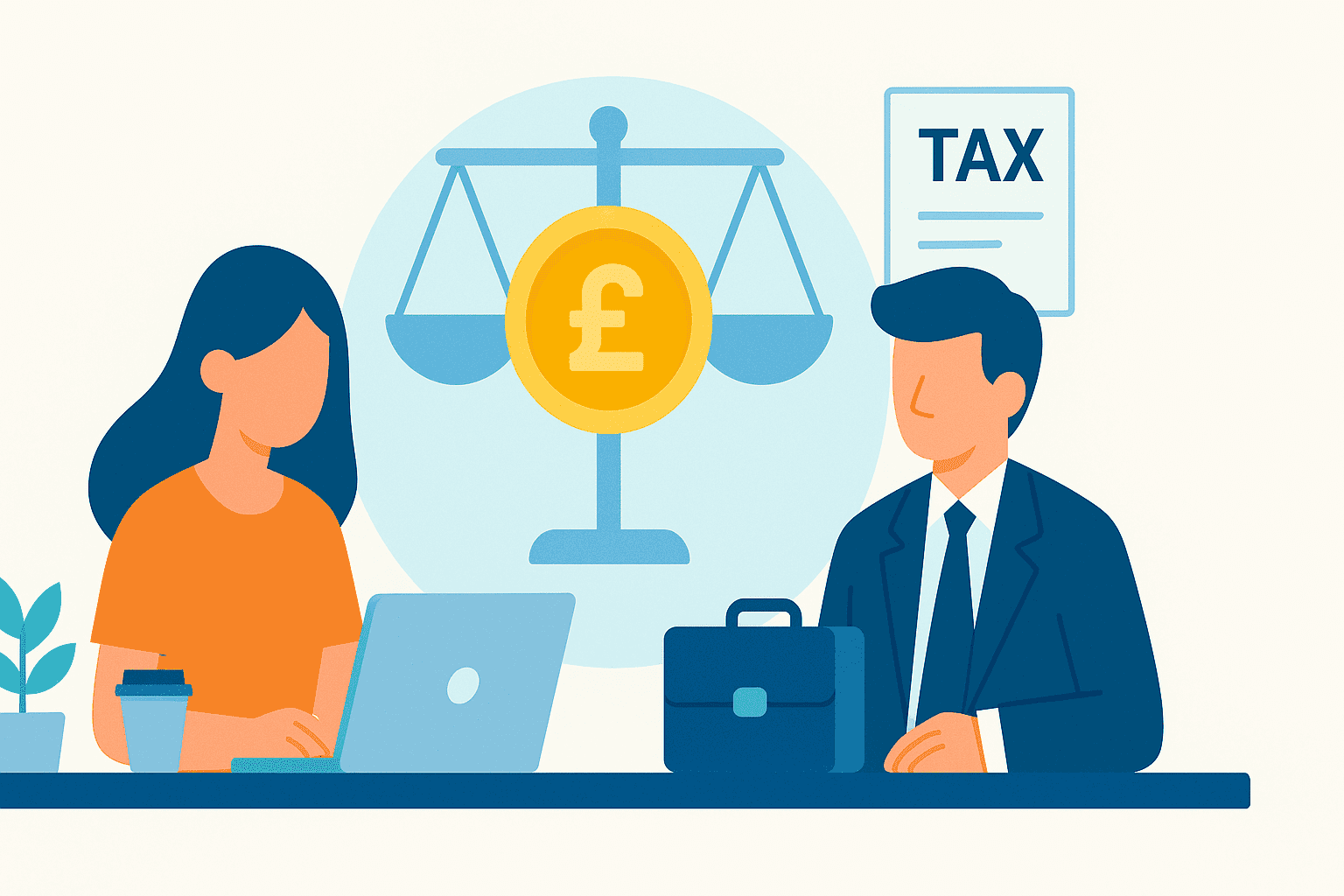Freelancing vs Full-Time: Which Pays More After Tax?
Wondering if freelancing or full-time employment pays more after tax in the UK? Discover how taxes and deductions influence your income.

Freelancing vs Full-Time: Which Pays More After Tax?
Have you ever wondered whether working as a freelancer in the UK would provide you with a greater remuneration than full-time employment? The choice between freelancing or working as an employee is not merely a choice of flexibility, because the net pay drastically differs after tax calculation. Taxes, expenses, or hidden costs differently impact your take-home pay, depending upon your employment status.
This guide will succinctly distinguish the incomes from freelancing and full-time jobs after taxes. You will come to understand the essential UK tax regulations, allowable expenses, and real-life income examples that will aid your decision-making process.
Basics of Taxation: Freelancer/Employee
Employee Taxes (PAYE)
In the UK, the full-time employees pay for income tax and National Insurance Contributions (NICs) using the PAYE scheme. Employers handle these monthly payments.
- Income Tax: income of 20%, 40%, or 45%, depending on the salary band.
- Employee NICs: 8% on earnings ranging between £242 and £967 per week (£12,570-£50,270 annually), 2% on earnings above £967/week (above £50,270 annually) (2025–26).
- Employer pension contributions (minimum 3% in auto-enrolment).
Freelancers and Self-Assessment
Freelancers or self-employed persons must declare their taxes with a Self-Assessment tax return.
- Income Tax paid on similar bands (20%, 40%, 45%), but by way of self-assessment.
- Class 2 NICs: abolished from April 2024. Voluntary contributions to the tune of £3.45/week can be paid to protect your State Pension where profits are below £6,845.
- Class 4 NICs: 6% on profits between £12,570 and £50,270; 2% on profits exceeding that (for 2025–26).
- Payments are due twice every year (31 January and 31 July).
Expenses and Deductions: The Windfall for Freelancers?
Freelancers are in a better position to deduct allowable expenses from their gross income, thereby shrinking their tax liability. Some deductibles are:
- Home office expenses (electricity, heating, broadband connection)
- Travel and accommodation
- Equipment and software
- Professional fees and subscriptions
- Marketing and advertising
Example: The freelance web designer who made £40,000 in a year may claim expenses of £8,000, shifting the taxable income down to £32,000. Conversely, an individual employed for the same amount usually pays taxes on the whole amount.
Contributions and Benefits of Pension System
In an circumstance for Employee
Employers automatically enrol employees into workplace pension schemes and generally provide contributions thereto, and:
- Sick pay and paid holiday
- Employer-supported childcare schemes
- Statutory redundancy payments
Whereas the freelancer points
Freelancers would need to arrange for own pension contributions, where personal pension schemes afford tax relief:
- At a basic rate (20%), this is claimed automatically by the providers of pensions.
- Higher-rate taxpayers have to claim additional relief through a self-assessment.
Tip: Freelancers should actively plan pension contributions in order to avoid being short-changed in later days.
Income Stability and Cash Flow
Full-Time Stability
Full-time employees are certain of their monthly salaries and thus enjoy the stability of cash flow. This eases budgeting and financial planning.
Freelancing: Variable Income
Cash flow management becomes very important in freelancing due to the irregularities in income. Some ways of handling fluctuating income are:
- Creating an emergency fund (expenses for 3-6 months)
- Diversifying income sources
- Invoice clients regularly to maintain a steady cash flow
Some Real-Life Scenarios: Income Comparison
Two individuals are in consideration:
- Full-time employee: salary of 50,000 pounds, PAYE taxes, automatic pension contribution.
- Freelancer: 50,000 pounds earnings, 10,000 pounds deductible expenses, personal pension contributions.
| Scenario | Gross Income | Taxable Income | Income Tax & NICs | Pension Contributions | Net Take-home |
|---|---|---|---|---|---|
| Employee | £50,000 | £50,000 | ~£10,516 | £2,500 | ~£36,984 |
| Freelancer | £50,000 | £40,000 | ~£7,151 | £1,200 (voluntary) | ~£31,649 |
So this scenario explains why a freelancer might take home more because of deductions, despite having exactly the same gross earnings.
Making Your Decision: Factors to Consider
Various considerations about the employment game will help shape your decision to go freelance or differently:
- Stability versus flexibility
- Managing yourself versus being supported by an infrastructure
- Potential earnings and expenses
- Long-term career and financial planning
Internal Resources and Tools
Get personalized insights from our salary calculator.
Conclusion
Paying less is pretty much a tug between possible income, taxation, and preferred lifestyle, hence one may think that a freelance career brings more take-home pay because you can claim expenses, whereas working full-time gives you a steady income and financial support.
Think about your financial objectives, your present situation, and the way you want to work. Having the knowledge can take you to make a good choice that maximizes your income and fits well into your life.